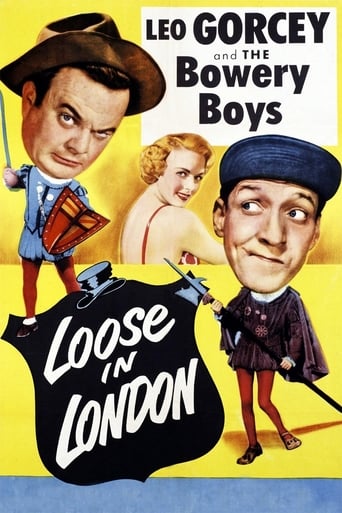MartinHafer
The Bowery Boys films were mindless entertainment. This is NOT meant as a criticism--they were quickly made and interesting B-movies with very modest pretenses. I mention this because you shouldn't expect a film that you'd find on a disc from The Criterion Collection or at a fancy film festival--they were popular entertainment for the masses. Because of that, I cut their films a lot of slack and realize they aren't 'high art'!"Loose in London" is one of the later films from the Boys. Because of that Sach and Slip are looking practically geriatric (they're hardly boys any more) and all the familiar old members of the gang have long since disappeared. It's simply the Sach and Slip show.The film begins with Sach (Huntz Hall) learning that a very, very distant relative in Britain wants to see him. Once there, the gang learn that the old man plans on leaving his fortune to someone...but hasn't yet decided. As for Sach's other family members, they've decided...Sach must die because he looks like the likely candidate because the Uncle seems to like him a lot! What follows is predictable and a nice time-passer. And, as usual, they manage to escape death...though you'd sure think these idiots would be the FIRST to die in real life!Nothing special, nothing bad here. The usual blend of slapstick and laughs and nothing more.
lzf0
It is with this film that the focus of the Bowery Boys movies becomes pure comedy. The change from gangster melodramas to comedy is gradual, and many of the Jan Grippo and Jerry Thomas films which precede this one point in the direction of comedy. Ben Schwab, the new producer of the series, wanted a purer sense of comedy. After doing "Jalopy", which used the regular writers and the regular director, William "One Take" Beaudine, Schwab replaced them with Ed Bernds and Elwood Ullman. These men had been working on Three Stooges shorts for years. Ullman was always a writer and Bernds had started as a sound effects man and had graduated to writer-director. The Bernds directed Columbia short comedies are usually superior to the ones produced at the same time by Jules White. Bernds and Ullman brought their short subject slapstick comedy style to the Bowery Boys and this produced the funniest movies in the series. Sure, the stories might have been better before, but the formula of someone walking in Louie's Sweet Shop and taking the boys out of their element was a great set-up for slapstick comedy. The focus of the films became Leo Gorcey and Huntz Hall; Bernard Gorcey is given better material, but David Gorcey and Bennie Bartlett slip more into the background or even out of the films. Schwab also replaced longtime musical director Edward Kay, whose music consists of transformations of "Sidewalks of New York" and "B" western clichés, with the more modern and comic sound of Marlin Skiles.
Leslie Howard Adams
And, they nor anybody else in this film saw London or England during its six-day production.As fate, and the writers, would have it, word comes to the Bowery that titled, great, great granduncle of Horace Debussy Jones (Huntz Hall), better known as Sach, is near death and has provided transportation to summon relatives from around the world. Sach and the Bowery Boys, Slip Mahoney (Leo Gorcey), Butch Williams (Bennie Bartlett), Chuck Anderson (David Gorcey as David Condon)and Soda Shoppe owner Louie Dumbrowsky (Bernard Gorcey), trade Sach's pre-paid first class ticket for lesser (much lesser) accommodations and embark for ye olde London towne.There, they find the old man, the Earl of Walsingham (Walter Kingsford) already surrounded by sinister Sir Edgar Whipsnade (John Dodsworth); Reggie (William Cottrell), the obligatory Fop; the spinster Aunt Agatha (Norma Varden); the young and seductive Lady Marcia (the young and seductive Angela Greene), moronic Cousin Herbert (Rex Evans), and Hoskins (James Logan), the Butler.They, of course,are assembled in a plot to slowly poison the old Earl and to get rid of Sach and his pals.No giveaway to lay their chances at slim-to-none.
Ramar
Fair is fair Oliver came to America to make movies, so America sent its finest...Mr. Huntz Hall to England.



